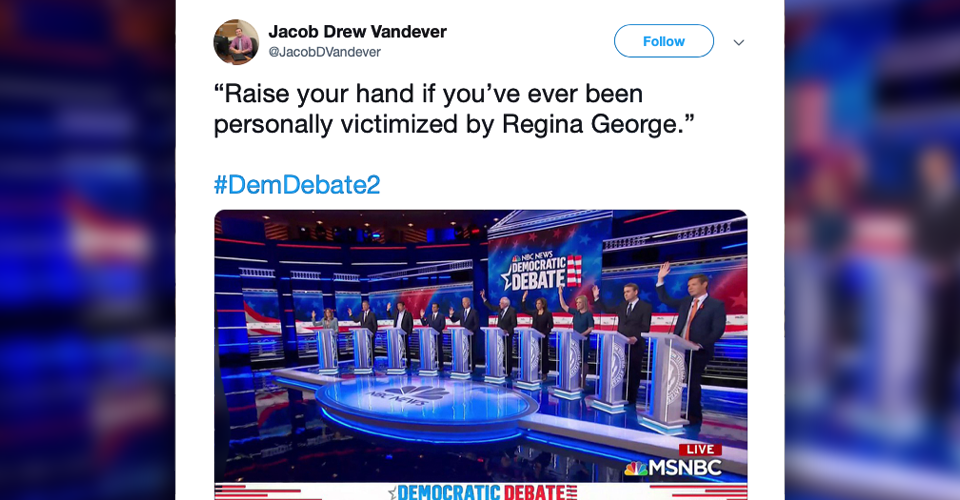The Meme Debates - 4 minutes read
 Who Won the First Democratic Debates? The Memes.
Who Won the First Democratic Debates? The Memes.Perhaps the memeiest moment came from another Kamala Harris mic-drop. After losing total control of the stage, a cacophony of voices had erupted. Taking the proverbial torch, Harris bellowed, “America does not want to witness a food fight. They want to know how we’re going to put food on their tables.” The interjection quelled the clamor, but it also underscored an ironic truth. “It's funny Kamala Harris says America doesn't want to see a food fight on the debate stage,” the writer Dan O’Sullivan tweeted, “when in fact that is the whole reason we are all watching.”
Buttigieg managed to handle the 60-second answer times well, offering responses that felt concise and complete, no matter how valid or coherent they might have been. He chastised the GOP for its hypocritical use of Christianity. He admitted, “I couldn’t get it done,” when asked about the racial composition of his police force. He quipped, “We have no idea which of our most important allies [Trump] will have pissed off most” when asked which foreign relationship he’d try to repair first. But even those moments of lucidity cemented his station as the young nerd of the group. “The senior superlative for most articulate debater goes to...,” Katie Couric tweeted, an ambiguous sneer that perfectly swirls Mayor Pete’s appeal and his inexperience into a delicious, summer soft-serve cone.
All throughout its almost 80-year commercial history, television has been deemed dangerous for two major reasons. First, because it condenses large, complex ideas into smaller, simpler ones. And second, because it invites the obsessive, endless stare-down of those ideas. The internet only accelerated those vices, launching ever more, ever smaller notions from anyone’s mouth, and perfecting the psychological apparatus that glues eyeballs to them almost constantly. The television stayed at home, at least, and had to be turned off on occasion. But the smartphone has no limits.
David Frum: The second debate gives Democrats three reasons to worry
The first televised presidential debate, between Kennedy and Nixon in 1960, became famous for shifting the weight of political media from radio to TV. As that debate’s producer, Don Hewitt, famously explained, if you consumed the debate by radio, Nixon seemed like the clear winner. But if you watched it on television, Kennedy came out ahead. The senator had taken the medium more seriously than Nixon, for one, but he was also more naturally telegenic than his opponent, who was only four years his senior. Nixon was sick, unprepared, and had refused makeup.
It’s tempting to conclude that social media on smartphones has replaced “legacy” media like television in the same way TV once replaced radio, but the truth is more complex and far messier. The media ecosystem has been reformed into a strange slurry of TV and the internet. That tends to amplify the worst features of both the old and the new forms. From television, media retains the ability to reach a massive audience all at once, barraging them with abridged messages that skim the surfaces of deep waters. Then the internet explodes those already compressed notions into shrapnel. For American voters, watching those fragments achieve momentary, clever appeal is far easier and more entertaining than attempting to piece it all back together.
As television blends with the internet, without succumbing to it, perhaps the worst feature of the meme debates that result is that there is no equivalent for Don Hewitt’s succinct explanation. The 20-person debate didn’t produce one winner online and another on broadcast news. It got detonated into rubble that cascades across every media channel. In the end, there was no winner save the memes, which rain their hot cunning down on everyone for a brief moment, before evaporating into futility.
Source: Theatlantic.com
Powered by NewsAPI.org
Keywords:
Democracy • Kamala Harris • Mic drop • Phonaesthetics • Foodfight! • Interjection • Kamala Harris • Foodfight! • Dan O'Sullivan • Reason • Pete Buttigieg • Christianity • Nerd • Katie Couric • Summer Soft • Soft serve • History (Canada) • Thought • Internet • Smartphone • David Frum • History of the United States Democratic Party • First Amendment to the United States Constitution • Television • United States presidential debates • John F. Kennedy • Political journalism • Radio • Television • Television producer • Don Hewitt • Radio • Television • John F. Kennedy • Mass media • Social media • Smartphone • Old media • Television • Television • Radio • Media ecology • Internet • Internet • Shrapnel shell • Internet • Meme • Don Hewitt • Broadcast journalism •